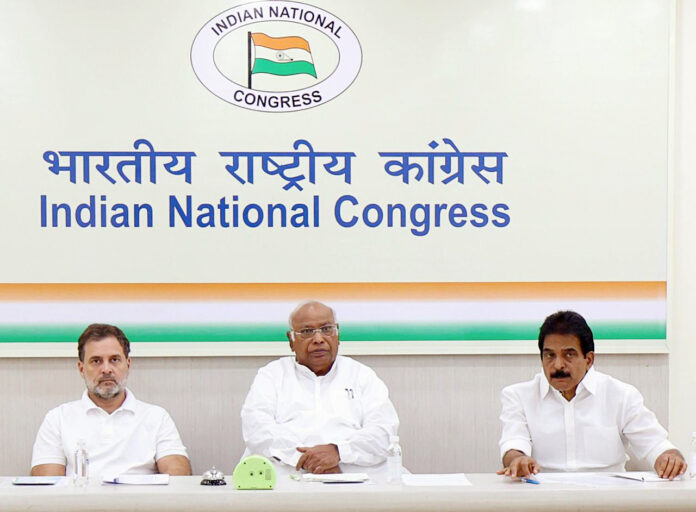
Congress faces deepening internal rifts, strategic confusion, and leadership crises amid rising national and state-level challenges.
New Delhi: The internal factions of the Congress party are increasingly coming to the surface. Multiple factors are contributing to the ongoing unrest. One major issue is the party’s organisational weakness. After crushing defeats in Haryana, Maharashtra, and Delhi, the Congress high command had promised significant structural reforms — but nothing substantial has materialised.
There is also a lack of consensus within the party on national-level political strategy. Whether it is the issue of the caste census or now Operation Sindoor, the party appears divided. Rahul Gandhi, the party’s top leader, continues to set the political narrative, but the issues he champions are failing to energise the grassroots cadre. During the caste census debate, only a handful of leaders spoke out. Now, on Operation Sindoor, it is only Gandhi and party president Mallikarjun Kharge who are vocally opposing the government’s foreign and war policies. Most of the media-facing spokespersons are leading the charge, while seasoned leaders — especially those experienced in foreign affairs — remain silent. Veteran Congress leaders like Anand Sharma, Shashi Tharoor, and Salman Khurshid have even supported the Modi government’s stance, indirectly voicing discontent with their own party’s position. Former Finance Minister P. Chidambaram also praised the government’s decisions regarding Pakistan, further exposing internal discord.
While the silence of Sharma and Khurshid may not have an immediate impact, the case of Tharoor is becoming increasingly serious. His stance has revealed deep divisions within the party’s Kerala unit — a state where Congress still had hopes of a resurgence. After losing the party president election and being sidelined in Parliament, Tharoor was hoping to take up a larger role in Kerala. However, with K.C. Venugopal (also from Kerala) being one of the most powerful figures in the party, he controlled the selection of the state president and executive members, leaving Tharoor and his supporter Ramesh Chennithala marginalised.
Tharoor then began charting his own path. On every major national security decision — from Operation Sindoor to the ceasefire — Tharoor has publicly supported the Modi government. The Congress leadership, caught in a dilemma, chose to distance itself from Tharoor’s remarks rather than take disciplinary action. Such a move could cost Congress dearly in Kerala, where the BJP would likely welcome Tharoor with open arms and a prominent role.
Tharoor’s presence alongside Modi during a recent visit to Kerala — where Kerala Chief Minister Pinarayi Vijayan (from the Left) was also present — sent a clear message: Congress is becoming increasingly isolated. The Indian Union Muslim League (IUML), Congress’s key ally in Kerala, has also backed the central government’s war strategy, creating further complications. Political analysts suggest that the shifting mood in Kerala could spell trouble for Congress. The new Waqf (Amendment) Act has boosted Christian support for the BJP. Although Congress appointed Sunny Joseph (a Christian) as state party chief to retain this voter base, he lacks the stature of A.K. Antony. Congress’s indifference toward state-level issues is becoming a costly misstep. In neighbouring Haryana, the party has still not appointed a Leader of the Opposition — even eight months after Assembly elections. Eventually, the state government began inviting former LoP Bhupinder Singh Hooda to official meetings. This has further weakened Congress’s position in the state.
In Himachal Pradesh, despite being in power, the situation is worse. With only Pratibha Singh acting as party president, and no cabinet reshuffle or formation of a new executive due to internal disputes, the government remains in disarray. Karnataka, too, is witnessing indecision from the party leadership, and other key states like Punjab, Uttarakhand, and Delhi continue to await much-needed organisational changes.
Despite ongoing electoral setbacks, the Congress high command has failed to take timely decisions regarding its state units. In this context, the government-opposing stance adopted by Congress in response to Operation Sindoor is also creating divisions within the party and further weakening morale.
This approach may backfire, especially in Hindi-speaking states where a large number of youth serve in the armed forces.
Operation Sindoor has changed the political landscape, and Congress’s “opposition for opposition’s sake” strategy may lead to significant electoral losses in the near future.







